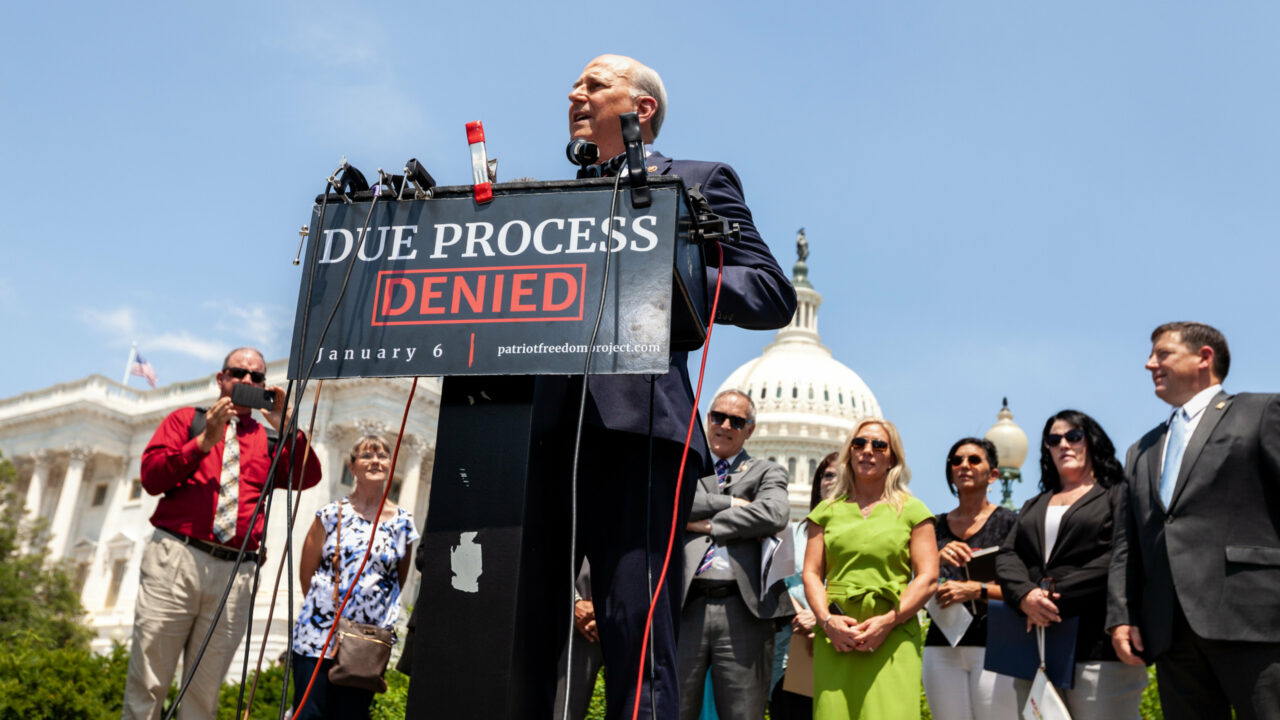Letter from Washington: Democracy on the ballot
In our new series of letters from Washington, Jeremy Shapiro helps you navigate a US election year that could have profound implications for Europe. In this first instalment, he outlines how campaigns fought on an opponent’s threat to democracy could imperil that very same ideal (and not only in the US)
The pantomime of the US primary campaign is finally over. Everyone now acknowledges that Donald Trump and Joe Biden will once again face off for the presidency. The hopeless plotting of traditional Republicans meant nothing in the end; nor did the youthful fantasies of progressive Democrats. Almost no one in the Washington bubble seems to want either Biden or Trump to run. Out in the rest of the country, however, almost everyone votes for one of them.
So, a scant ten months before the big day, the US election campaign can begin in earnest. It will be a long, painful experience, with many twists and turns, and an almost certainly unsatisfying conclusion. But already one can discern the main theme of this election: perhaps surprisingly, it is democracy.
Two campaigns, one message
Both Biden and Trump are centring their campaigns around the idea that their opponent poses a threat to the very foundations of the Republic – and to the core freedoms Americans like to sing about in their anthems and country songs.
Biden opened his campaign with a speech on the anniversary of the 6 January US Capitol riot, declaring that Trump “is willing to sacrifice our democracy to put himself in power.”
Not be outdone, Trump regularly posts to his Truth Social outlet that he is subject to a “Biden Directed Witch Hunt” and that “Our Legal System is out of control, and being used as a Political Weapon. They have taken away all First Amendment Rights. THIS IS NOT AMERICA!” (capitalisation all his own work).
Of course, the campaign is also about policy. Immigration, abortion, the economy, and even occasionally foreign policy are all issues on which the candidates vociferously disagree, and over which they both assert much is at stake in November.
But democracy overshadows all those issues in both candidates’ rhetoric. After all, successive administrations can build or tear down border walls, appoint liberal or conservative judges, raise or lower taxes, and deploy or withdraw troops abroad. But a democracy once destroyed cannot be so easily restored. In the type of tyrannical regime both sides warn about, there will be no subsequent administration. Genuine opposition will simply disappear under the jackboot of a weaponised judicial system and the federal government’s many other tools of repression.
The 2024 campaign is therefore not about any specific policy decision. It is, in both campaigns’ messages, about who gets to decide on policy forever. Campaigns always feature hyperbole, but it is nonetheless striking that both sides have latched onto an existential threat to democracy as their central message.
Campaigns always feature hyperbole, but it is nonetheless striking that both sides have latched onto an existential threat to democracy as their central message
The democracy argument has its roots in the 6 January riot. The attack on the Capitol served as the ultimate proof for Democrats that Trump would do anything to preserve his power, with no regard for the institutions and norms of democracy. Democratic partisans demanded that the rioters – and Trump himself – pay the legal consequences of their actions. Trump, facing legal peril on multiple fronts, muddied the waters through his usual tactic of accusing his opponent of the same sin of which he is charged. He has labelled the convicted 6 January rioters “political prisoners” and floated the idea of pardoning them if takes back the presidency.
‘Democracy in peril’ works for both sides because the US electorate is deeply polarised by years of bitter partisan rancour. Voters are ready to believe anything about the other camp, from the idea that they engage in paedophilia to the notion they are in the pocket of Vladimir Putin.
Moreover, in such a polarised environment, there are few people left to convince. The winning side will be the one that best mobilises its partisans (and convinces the other’s to stay at home). Little motivates better than the idea that one’s very freedom and future is at stake. Neither side can afford to cede that ground to the other.
The threat to democracy from a campaign about democracy
The campaigns no doubt exaggerate the threat that the opposing candidate poses to democracy. But the fact that both sides are making the same existential argument means that the campaign itself has the potential to create the danger it most warns about. After all, if your opponent is a threat to your very way life, everything is justified to stop him – even, ironically, if it is undemocratic.
This is already having an impact, including on foreign policy. In January the Biden administration and Republicans in Congress seemed on the threshold of a deal in which the Biden administration would accept some Republican immigration priorities in return for Republican approval of a large package of US aid to Ukraine, Taiwan, and Israel. But then Trump stepped in and declared that any deal on immigration would simply help the evil Biden retain the presidency. Traditional Republicans condemned the move. Senator Mitt Romney, for example, called it “appalling” that Trump would sacrifice their policy priorities on securing the United States’ southern border for the sake of his campaign.
But if democracy is at stake, isn’t that the right thing to do? Most Republican voters and thus most congressional Republicans will likely agree with Trump. The immigration deal seems dead – and along with it many of the Republicans’ own foreign policy priorities.
Finally, democracy-based campaigning will also likely affect how either man would govern and their foreign policy. Biden will double down on his rhetoric that the global struggle is between democracy and authoritarianism, increasingly forcing the United States’ partners to choose between it and China. Trump will make common cause with populist leaders across the world, who often similarly make the case that their opposition is a threat to democracy and therefore needs to be suppressed – even through non-democratic means. Putting the weight of America behind this idea will encourage governments around the world to use it to entrench their hold on power.
Democracy is indeed on the ballot this November. But it seems likely to lose, no matter which candidate prevails.
The European Council on Foreign Relations does not take collective positions. ECFR publications only represent the views of their individual authors.



